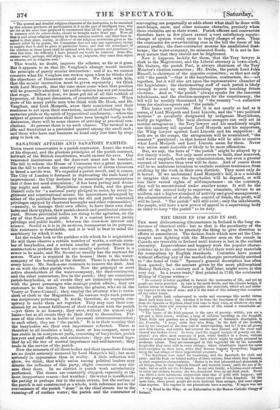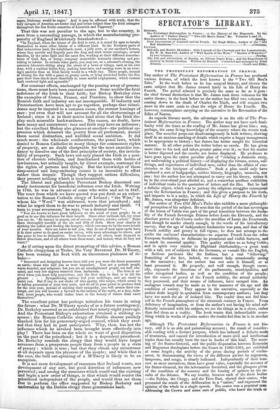THE IRISH IN 1749 AND IN 1847.
THE most disheartening circumstance in Ireland is the long en- durance of identical evils : but as that is the peculiarity of the country, it ought to be precisely the thing to give direction to efforts at amendment. The faction-feuds which now set the Con- naught men fighting with the Munster men on the canals in Canada are traceable in Ireland until history is lost in the earliest obscurity. Improvidence and beggary were the popular charac- teristics up to the earliest times at which there were any materials for comparison by English standards. Centuries have passed without effecting any of the marked changes proverbially ascribed to "the hand of time." Spenser's general description has often been quoted ; but the account given by the more philosophical Bishop Berkeley, a century and a half later, might serve at this very day. In a scarce tract, first printed in 1749, the celebrated Bishop of Cloyne writes- " No country is better qualified to furnish the necessaries of life, and yet no people are worse provided. In vain is the earth fertile, and the climate benign, if human labour be wanting. Nature supplies the materials, which art and indus- try improve to the use of man; and it is the want of this industry that occasions all our other wants.
"The public bath endeavoured to excite and encourage this useful virtue. Much bath been done; but, whether it be from the heaviness of the climate, or from the Spanish or Scythian blood that runs in their veins or whatever else may be the cause, there still remains in the natives of this island a remarkable an- tipathy to labour. " • • 4' The house of the Irish peasant is the cave of poverty: within, you see a pot and a little straw; without, a heap of children tumbling on the dunghill. .fheir fields and gardens are a lively counterpart of Solomon's description in the Proverbs. went,' saith that wise King, by the field of the slothful, and by the vineyard of the man void of understanding, and lo! it was all grown over with thorns, and nettles had covered the face thereof, and the stone wall thereof was broken down.' In every road the ragged ensigns of poverty are dis- played: you often meet caravans of poor' whole families in a drove, without clothes to cover or bread to feed them; both which might be easily procured by moderate labour. They are encouraged in this vagabond life by the miserable hospitality they meet with in every cottage; whose inhabitants expect the same kind reception in their turn, when they become beggars themselves; beggary being the last refuge of these improvident creatures. '1' • • •
"The Scythimis were noted for wandering, and the Spaniards for sloth and pride: and the Irish are behind neither of these nations, from which they descend, in their respective characteristics. 'Better is he that laboureth and aboundeth all things, than he that boasteth himself and wanteth bread,' saith the son of Si- rach; but so saith not the Irishman. In my own family, a kitchen-maid refused to curry out cinders, because she was descended from an old Irish stock. Never was there a more monstrous conjunction than that of pride with beggary; and yet this prodigy is seen every day in almost every part of this kingdom. At the same time, these proud people are more destitute than savages, and more abject than negroes. The negroes in our plantations have a saying, If negro was not • "A Word to the Wise; or an Exhortation to the Roman Catholic Clergy of Ireland." negro, Irishman would be negro.' And it may be affirmed with truth, that the very savages of America are better clad and better lodged than the Irish cottagers throughout the fine fertile countries of Limerick and Tipperary."
That this was not peculiar to the age, but to the country, is seen from a succeeding passage, in which the manufacturing pro- pensity of England if curiously foreshadowed— "In England, when the labour of the field is over, it is usual for men to betake themselves to some other labour of a different kind. In the Northern parts of that industrious land, the inhabitants meet, a jolly crew, at one another's houses, where they merrily and frugally pass the long and dark winter evenings; several families, by the same light and the same fire, working at their different manufac- tures of wool, flax, or hemp; company meanwhile mutually cheering and pro- voking to labour. In certain other 'Darts, you may see, on a summer's evening, the common labourers sitting along the street of a town or village, each at his own door, with a cushion before him, making bone-lace and earning more in an even- ing's pastime than an Irish family would in a whole day. Those people, instead of closing the day with a game on greasy cards, or lying stretched before the fire pass their time much more cheerfully in some useful employment, which custom
l lath rendered light and agreeable."
For constant effects, unchanged by the passing away of genera- tions, there must have been constant causes. Some ascribe the fatal indolence of the Irish to their faith; but Bishop Berkeley cites the examples of Genoa, France, and Flanders, to show that the Romish faith and industry are not incompatible. If industry and Protestantism have been apt to go together, perhaps that coinci- dence may be imputed to a common cause, the sterner leanings of race : yet even that will not account for all the shortcomings of Ireland ; since it is in their native land alone that the Irish dis- play such miserable backwardness. The causes, no doubt, have been many and concurrent : race and faith may have an influence; but the excellent Bishop also glances at another—the political op- pression which debarred the gentry from all preferment, denied them social distinction, and nullified social ambition. It did much more : the wholesale confiscations, the penal laws, which denied to Roman Catholics in many things the commonest rights of property, are no doubt chargeable for the most anarchic ten- dency to dissolve one of the first principles of society, the inviola- bility of property. Such laws not only placed the Irish in a posi- tion of chronic rebellion, and familiarized them with habits of lawlessness, but actually taught, by direct example, contempt fer the rights of persons and things. But the knowledge of these deep-seated and long-enduring causes is an incentive to effort rather than despair. Though they suggest serious difficulties, they present nothing which is insurmountable.
The liberal and philosophic Protestant Bishop discerned one
ready instrument for beneficial influence over the Irish. Writing in 1740, he was in advance of some who write and act in 1847. The tract from which we have quoted was put forth as an exhor- tation to the Roman Catholic clergy of Ireland ; "the Wise," to whom his "Word" was addressed, were that priesthood ; and what he urged them to do was to preach industry and thrift. "I turn to your reverences," he says, "as a dernier resort "—
"You are known to have great influence on the mind of your people; be so good as to use this influence for their benefit. Since other methods fad, try what you can do. 'Be instant in season, out of season; reprove, rebuke, exhort.' Make them thoroughly sensible of the sin and folly of sloth. Show your charity in clothing the naked and feeding the hungry; which you may do by the mere breath of your mouths. Give me leave to tell you, that no set of men upon earth have it in their power to do good on easier terms, with more advantage to others and less pains or loss to themselves. Your flocks are of all others most disposed to follow directions, and of all others want them most; and indeed, what do they not want?"
As if acting upon the direct prompting of this advice, a Roman Catholic clergyman at Tralee, the Very Reverend Dr. M'Enery, has been rousing his flock with an uncommon plainness of re- buke— " Interested and designing knaves have told you you were the finest peasantry on earth: those who told you so were impostors. You are a patient people, warm-hearted, and religious; but you are an unenlightened people, not half edu- cated, and very few degrees removed from barbarism. . . . The time is ar- rived when you must help yourselves; and the first step to that is to till the ground. . . . Sympathizing nations feel your sufferings, and are ready to assist you. But if you do not shake off this apathy, this torpor, which seems to be taking possession of your very souls and do all in your power to produce food for the next year, instead of exciting ;heir sympathy, you will arouse their con- tempt, and you will become a byword to the nations of the earth, as a hay, indo- lent, mean people, who would rather trust to the bounty of others than exert themselves.'
The excellent priest has perhaps mistaken his tense in using
the future : what Dr. WEnery speaks of as a future contingency, Dr. Berkeley asserted as an established fact ninety-eight years ago. And the Protestant Bishop's exhortation obtained a striking re- sponse: the Roman Catholic clergy of Dublin diocese publicly thanked him for his generously-urged counsel, which they aver- red that they had in part anticipated. Why, then, has not the influence which he invoked been brought more effectively into play t There has been on the whole no want of good disposition on the part of the priesthood : but it is a dependent priesthood. Dr. Berkeley reminds the clergy that they would have larger revenues from a prosperous people than from a people in a state of penury : which is true ; but that they obtain any subsistence at all depends upon the pleasure of the people; and while that is the case, the bold out-speaking of a WEnery is likely to be an exception.
It is not mere development of resources that Ireland wants, nor
development of any sort, but good direction of influences now perverted ; and among the measures which mould end the existing and begin a new order of things, is that which would render the priesthood independent of the people, and would thus set them free to perform the office suggested by Bishop Berkeley and undertaken by the Dublin clergy three generations back.



























 Previous page
Previous page